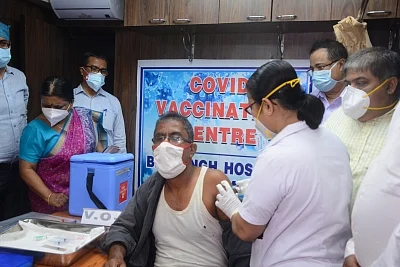As India made a milestone on Thursday by achieving one billion vaccine doses in nine months, experts have said that the country will clock in the next billion doses in about three to four months.
"How do I reach 100% of the population by the end of the year? At least one dose we should be able to give most of the adults by the end of the year and within the next 4-6 weeks second doses will also be given," Dr NK Arora, who heads the National Expert Group on Vaccine Administration told NDTV.
Around 75 percent of India's all eligible adult population have been administered at least the first dose and around 31 percent has received both the doses of the vaccine.
Medical experts said that they expected to reach this target much earlier but the delay was caused by low supply. About 80-90 crore doses have been arranged for the next three to four months, after which we will scale up in an even bigger way, he said.
Prime Minister Narendra Modi on Thursday congratulated the country and called it "the triumph of Indian science, enterprise and collective spirit of 130 crore Indians".
India's COVID-19 vaccination drive was launched on 16 January, 2021. Initially, the vaccination was opened for Health Care Workers only and from 2 February, front-line workers too were made eligible for vaccination. The vaccination drive was expanded from 1 March to include people above 60 years of age and those above 45 years with specified co-morbidities. It was further expanded to all people above 45 years of age from 1 April. From 1 May, all people above 18 years of age were made eligible for COVID-19 vaccination.
Congratulating India, Dr Poonam Khetrapal Singh, regional director of WHO South-East Asia, said, "This extraordinary feat in a short span was not possible without strong political leadership, intersectoral convergence, dedicated efforts of the entire health and frontline workforce and the people themselves."
(With inputs from NDTV)
(At The Quint, we question everything. Play an active role in shaping our journalism by becoming a member today.)
